Theodore Roosevelt desk
Theodore Roosevelt desk is a Colonial Revival-style double-pedestal desk in the collection of the White House. Made in 1903, it is one of only six desks to have been used by U.S. presidents in the Oval Office.
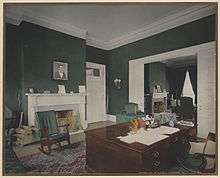 The Theodore Roosevelt desk in the White House Executive Office, 1904. | |
| Designer | Charles Follen McKim |
|---|---|
| Date | 1903 |
| Made in | Boston, Massachusetts by A. H. Davenport and Company |
| Materials | Mahogany |
| Style / tradition | Colonial Revival |
| Height | 30 in (76 cm) |
| Width | 90 in (230 cm) |
| Depth | 53.5 in (136 cm) |
Design and markings

The desk is made of mahogany. The pedestal on each side has four drawers with thin brass pulls, and a slide-out shelf. There are cabinet doors on the opposite side, but no drawers. The center drawer features a carved shield with vertical stripes below a field of stars. The desk measures 90 inches by 53 1/2 inches, and is 30 inches tall.[1]
Beginning in the 1940s, each user of the desk signed the interior of the center drawer at the end of his term in office.[2]
History
The desk was designed by architect Charles Follen McKim, who made extensive renovations to the White House during the Theodore Roosevelt Administration. It was made by furniture-maker A. H. Davenport and Company, of Boston, Massachusetts.[3] Roosevelt was the first U.S. president to use the desk, placing it in the Executive Office of the newly built West Wing.
Roosevelt's successor, President William Howard Taft, doubled the size of the West Wing and built its first Oval Office. He placed the desk at the south end of the room, in front of the three windows. It remained there for over twenty years, and was used by Presidents Woodrow Wilson, Warren G. Harding, Calvin Coolidge, and Herbert Hoover.
The West Wing suffered a major fire on December 24, 1929, but the desk was undamaged. An association of Grand Rapids, Michigan furniture-makers donated a new desk, and President Hoover used that for the remainder of his term.[4] President Franklin D. Roosevelt demolished the old Oval Office in 1933, and built the modern one. He used the Hoover desk in both offices. The Theodore Roosevelt desk remained in storage from December 1929 to 1945.[2]
President Harry S. Truman was the first to place the desk in the modern Oval Office. President Dwight Eisenhower, also used it as his Oval Office desk.
President John F. Kennedy used the Resolute desk in the Oval Office. He passed on the Theodore Roosevelt desk to Vice-President Lyndon Johnson.
President Richard Nixon used the Oval Office as a ceremonial space. He placed the desk in an office in the Old Executive Office Building, where he preferred to work. Stephen Hess of the Brookings Institution presumes that, "the Watergate tapes were made by an apparatus concealed in its drawer."[5]
More recently, the desk was used by Vice-President Richard Cheney, 2001–2009, in his ceremonial office in the Eisenhower Executive Office Building.
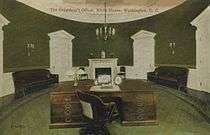 In the Taft Oval Office, 1909.
In the Taft Oval Office, 1909.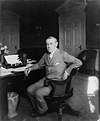 In the Wilson Oval Office, c. 1913.
In the Wilson Oval Office, c. 1913. With mourning crepe, on the day of President Harding's funeral, August 8, 1923.
With mourning crepe, on the day of President Harding's funeral, August 8, 1923. In the Coolidge Oval Office, 1923.
In the Coolidge Oval Office, 1923. In the Truman Oval Office, 1946.
In the Truman Oval Office, 1946.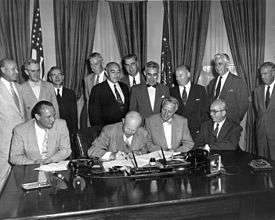 In the Eisenhower Oval Office, 1954.
In the Eisenhower Oval Office, 1954. In President Nixon's office in the Old Executive Office Building, 1971.
In President Nixon's office in the Old Executive Office Building, 1971.
Replicas
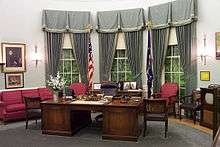
A replica of the Theodore Roosevelt desk is located in the Harry S. Truman Presidential Library and Museum, in Independence, Missouri, as a part of a full-scale replica of the Oval Office furnished as it was during Truman's presidency.[6]
References
- "Memo, Frank Pagnotta to Robert Hartmann" Ford Library. Gerald R. Ford Presidential Handwriting File, retrieved January 25, 2017
- "The Vice President's Ceremonial Office," Archived 2011-07-09 at the Wayback Machine. The White House. Retrieved October 20, 2015
- William Allman, White House Curator, "Oval Office Tour, December 1, 2008," CSPAN documentary, 14:45.
- William Seale, The President's House (White House Historical Association, 1986), p. 918.
- Hess, Stephen, What Now? The Oval Office Archived 2011-06-05 at the Wayback Machine. Brookings Institution. January 08, 2009. Accessed July 26, 2013
- Harry S. Truman: The Presidential Years. Harry S. Truman Presidential Library and Museum. Retrieved October 20, 2015
External links
